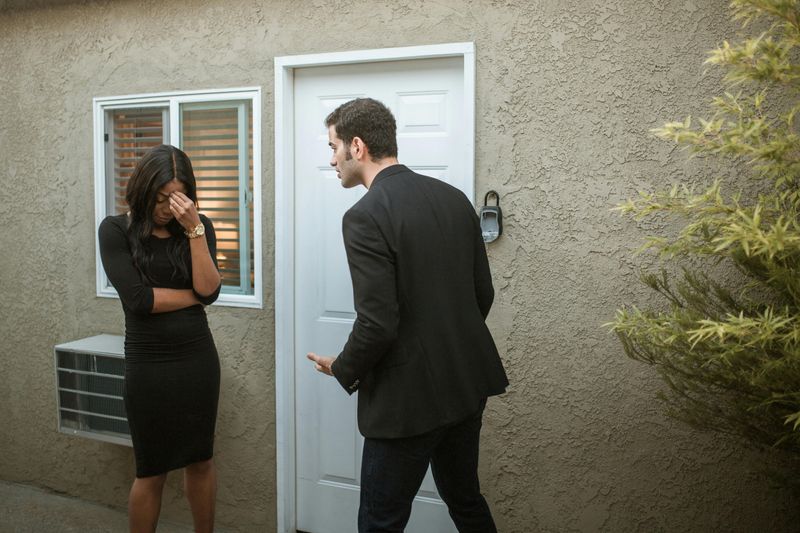17 Painful Arguments Unhappy Couples Keep Having Again and Again

Every relationship has its ups and downs, but unhappy couples often find themselves stuck in the same painful arguments over and over. These recurring fights aren’t just about the topic at hand—they reveal deeper issues like trust, respect, and emotional connection. Understanding these patterns can help you recognize what’s really going wrong and take steps toward healing or moving forward.
1. You Never Really Listen to Me

Feeling unheard cuts deep. When one partner repeatedly feels dismissed or ignored, it creates a wall between two people who once shared everything. This argument usually surfaces when someone tries to express feelings or concerns, only to be met with distraction, interruption, or indifference.
Over time, being ignored chips away at trust and intimacy. The partner who feels unheard starts believing their thoughts and emotions don’t matter. They may stop sharing altogether, leading to emotional distance that feels impossible to bridge.
Fixing this requires active listening—putting down phones, making eye contact, and truly absorbing what your partner says. Validation doesn’t mean agreement; it means acknowledging their feelings as real and important.
2. Why Do I Always Have to Ask for Help?

Nothing breeds resentment faster than feeling like you’re carrying all the weight. Whether it’s household chores, childcare, or emotional support, an imbalance makes one partner feel like a servant rather than an equal. The constant need to ask, remind, or beg for help becomes exhausting and demeaning.
This fight often stems from different expectations about responsibilities. One partner might not even realize the imbalance exists, while the other is drowning in tasks and frustration. The person doing more feels invisible and undervalued.
Addressing this means having honest conversations about dividing labor fairly. Both partners need to take initiative without being asked, showing they care about maintaining the relationship and home together.
3. You Always Twist What I Say

Miscommunication turns molehills into mountains. When one partner feels their words are constantly twisted or misinterpreted, simple conversations become minefields. Defensiveness takes over, and both people end up arguing about what was said rather than the actual issue at hand.
This pattern often reveals deeper insecurity or past hurts coloring present conversations. Someone might hear criticism where none was intended, or assume the worst interpretation of innocent comments. Trust erodes when you can’t communicate without everything becoming a battle.
Breaking this cycle requires slowing down and clarifying intentions. Ask questions like, “What I heard was… is that what you meant?” Approach conversations with curiosity rather than defensiveness to rebuild understanding.
4. You Care More About Your Phone, Work, or Friends Than Me

Neglect hurts, especially when it feels like you’re competing with a screen or career for your partner’s attention. Quality time together disappears when one person is constantly distracted by work emails, social media, or outside friendships. The neglected partner feels like an afterthought rather than a priority.
This argument signals that intimacy and connection are suffering. Relationships need nourishment through shared experiences and undivided attention. When that disappears, loneliness creeps in even when you’re in the same room.
Rebuilding connection means setting boundaries around technology and work. Schedule regular date nights or phone-free time together. Show your partner they matter by being present, not just physically there but mentally and emotionally engaged too.
5. You Never Initiate Anything Anymore

Always being the one to initiate affection, dates, or intimacy feels incredibly lonely. When effort becomes one-sided, the person doing all the work starts feeling unwanted and undesirable. They wonder if their partner even cares anymore or if the spark has completely died.
This pattern often reflects deeper issues like stress, depression, or fading attraction. The partner who stops initiating might not realize how their lack of effort impacts the relationship. Meanwhile, the other person’s self-esteem takes a beating.
Honest conversations about needs and desires are essential here. Both partners must make conscious efforts to show love and interest. Small gestures—planning surprises, initiating kisses, suggesting activities—can reignite the passion that’s fading away.
6. Everything is Always on Your Terms

Relationships require compromise, but power struggles emerge when one person always calls the shots. Whether it’s deciding what to watch, where to eat, or bigger life choices, having no say breeds resentment. The dominated partner feels invisible, like their preferences and opinions don’t count.
This dynamic often develops gradually. One person might be more assertive or decisive, and the other goes along to keep peace. Eventually, the accommodating partner realizes they’ve lost themselves in the relationship and their voice no longer matters.
Healthy relationships need balance and mutual respect. Both people deserve input on decisions that affect their lives. Practicing compromise and actively seeking your partner’s opinion shows you value them as an equal, not a subordinate.
7. Why Do You Always Bring That Up?

Reopening old wounds is a clear sign that past issues never truly got resolved. When the same mistakes, betrayals, or arguments resurface repeatedly, it shows that forgiveness hasn’t happened or trust hasn’t been rebuilt. These unhealed hurts poison current interactions and prevent moving forward.
Sometimes people bring up the past as ammunition during new fights, which is deeply unfair and destructive. Other times, the original issue genuinely never got addressed properly, leaving emotional scars that need attention and healing.
True resolution requires both acknowledgment and change. The offending partner must genuinely apologize and demonstrate different behavior. The hurt partner must work toward forgiveness. If old issues keep resurfacing, couples counseling might help process and finally heal these wounds.
8. You Make Me Feel Like I’m Not Enough

Constant criticism or lack of affirmation destroys self-worth. When compliments disappear and criticism increases, the targeted partner starts believing they’re fundamentally flawed or inadequate. This emotional damage extends beyond the relationship, affecting their confidence in all areas of life.
Sometimes this happens intentionally through put-downs and comparisons. Other times, it’s unintentional—one partner simply stops expressing appreciation while the other’s need for validation grows. Either way, feeling not enough creates deep insecurity and pain.
Partners should build each other up, not tear each other down. Express genuine appreciation regularly. Notice efforts and improvements. Offer encouragement during struggles. Creating a supportive environment where both people feel valued and enough is essential for relationship health and individual well-being.
9. You Don’t Even Look at Me the Same Way Anymore

Small changes in behavior reveal big shifts in feelings. When loving glances become indifferent stares, when touch decreases, when excitement about seeing each other fades—these changes signal emotional disconnection. The partner who notices feels the loss of intimacy and warmth that once defined the relationship.
Sometimes life stress causes temporary emotional withdrawal. Other times, feelings genuinely change as people grow apart or attraction fades. Regardless of cause, acknowledging this shift is painful but necessary for addressing what’s really happening.
Reconnecting requires intentional effort and honest communication. Talk about what’s changed and why. Make time for activities that once brought joy. Seek to understand each other’s inner worlds again. Sometimes counseling helps couples rediscover connection, while other times this conversation leads to recognizing incompatibility.
10. We’re Basically Roommates

When romance dies but cohabitation continues, couples become glorified roommates. They share space and responsibilities but lack emotional and physical intimacy. Conversations become transactional—about bills, schedules, and logistics—rather than dreams, feelings, and connection.
This often happens gradually as busy lives crowd out couple time. Date nights disappear, affection becomes rare, and emotional sharing stops. What remains is a functional partnership without the love and passion that once existed.
Escaping roommate mode requires deliberate action. Schedule regular dates and meaningful conversations. Reintroduce physical affection and intimacy. Share vulnerabilities and dreams again. If both partners want to reconnect, it’s possible. If the spark is truly gone, acknowledging that truth matters too.
11. You’re Always Angry or You’re Always Emotional

Personality differences that once seemed charming can become sources of constant friction. When one partner sees the other as perpetually angry, overly sensitive, or too emotional, mutual frustration builds. Neither person feels understood or accepted for who they truly are.
These labels are often unfair oversimplifications. The “angry” person might be expressing legitimate frustration poorly. The “emotional” person might simply process feelings differently. When partners can’t appreciate these differences, contempt replaces compassion.
Healthy relationships embrace personality differences rather than criticize them. Learn your partner’s emotional language and triggers. Respond with patience instead of judgment. If fundamental incompatibility exists in how you handle emotions, that’s important information about whether the relationship can succeed long-term.
12. I Feel Like I’m Doing This Alone

Feeling abandoned while still in a relationship is profoundly lonely. Whether it’s emotional support, parenting, or life challenges, doing everything solo while supposedly partnered creates deep resentment. The isolated partner wonders what the point of the relationship even is if they’re facing life alone anyway.
This abandonment might be physical—one partner travels constantly or stays out frequently. More often, it’s emotional—one person checks out mentally and emotionally, offering no support or engagement during difficult times.
Partnerships require presence and participation from both people. If you’re feeling alone, communicate that clearly. If your partner expresses this, recognize it as a serious warning sign. Show up for each other emotionally and practically. Relationships cannot survive when one person carries all the weight alone.
13. You Don’t Respect Me

Respect is the foundation of healthy relationships, and its absence is deadly. When contempt replaces appreciation, relationships crumble. Disrespect shows through eye-rolling, name-calling, dismissing opinions, public embarrassment, or ignoring boundaries. The disrespected partner feels devalued and humiliated.
Research shows contempt is one of the strongest predictors of relationship failure. Once partners view each other with disdain rather than admiration, recovering that respect becomes incredibly difficult. Negative patterns become entrenched and hard to break.
Rebuilding respect requires acknowledging harmful behaviors and committing to change. Speak kindly even during disagreements. Honor boundaries and opinions. Show appreciation regularly. If contempt has taken root deeply, professional help may be necessary. Without mutual respect, relationships cannot survive or provide happiness to either partner.
14. We Never Actually Resolve Anything

Circular arguments drain relationships dry. When the same fights happen repeatedly without resolution, both partners feel exhausted and hopeless. These conversations go nowhere, with each person repeating their position while refusing to truly hear the other or find compromise.
This pattern often stems from poor conflict resolution skills. Neither person knows how to effectively communicate needs, validate feelings, or reach genuine solutions. Instead, arguments end in stalemates, silent treatment, or temporary truces that don’t address underlying issues.
Learning healthy conflict resolution changes everything. Focus on understanding rather than winning. Identify the real issue beneath surface arguments. Brainstorm solutions together. Sometimes professional guidance helps couples learn these crucial skills. Without resolution, conflicts multiply and relationships deteriorate into constant, pointless fighting that helps no one.
15. What’s Even the Point Anymore?

When hopelessness sets in, the relationship is in critical danger. This question signals that one or both partners are seriously questioning whether staying together makes sense. The joy, purpose, and connection that once defined the relationship have vanished, replaced by doubt and despair.
This usually comes after prolonged unhappiness and failed attempts at improvement. Exhausted from fighting, feeling unloved, or experiencing disappointment, partners wonder if they’re wasting time in a dead relationship. This is often a last cry for change before someone gives up entirely.
If you’re asking this question, the relationship needs immediate attention—either serious effort to repair it or honest acknowledgment that it’s over. Couples therapy, open conversations about needs, and genuine commitment to change might save it. Sometimes, though, this question leads to the painful but necessary conclusion that parting ways is healthiest for everyone.
16. You Always Make Me Feel Like My Dreams Don’t Matter

Supportive partners celebrate each other’s ambitions and goals. When one person consistently dismisses, minimizes, or ridicules the other’s dreams, it damages both the relationship and individual well-being. The dismissed partner feels small, foolish, and alone in pursuing what matters to them.
This might involve career aspirations, creative pursuits, personal growth goals, or lifestyle changes. Whether through direct mockery or subtle discouragement, unsupportive partners make their significant others feel like their dreams are silly, impossible, or unimportant.
Healthy relationships involve championing each other’s growth and happiness. Even if you don’t fully understand your partner’s goals, showing interest and encouragement matters immensely. If someone makes you feel bad about your aspirations, consider whether they’re the right partner. Life is too short to spend with someone who diminishes your dreams instead of helping you reach them.
17. Why Am I Always the One Who Has to Change?

Compromise should flow both ways. When one partner constantly adapts, sacrifices, and changes while the other remains rigid, resentment builds quickly. The flexible partner eventually feels like they’re losing themselves, molding into whatever their partner wants while receiving nothing in return.
This imbalance often starts small—one person being more easygoing—but grows into a pattern where all accommodation becomes expected from one side. The unchanging partner may not even recognize their inflexibility, viewing their way as simply correct or necessary.
True partnership requires mutual flexibility and sacrifice. Both people should occasionally stretch beyond their comfort zones for the relationship. If you’re always the one changing, speak up about needing reciprocity. If your partner expresses this frustration, examine your own willingness to compromise. Relationships require give and take from both sides, not one person doing all the bending.

Comments
Loading…